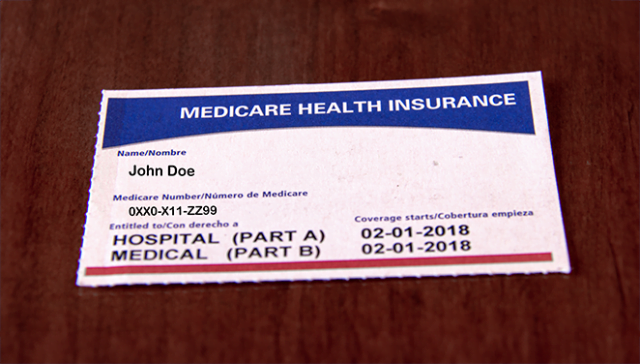
New Retirees: Avoid Costly Medicare Sign-up Mistakes
To retire is to enter the unknown.
Rick Fine has demystified one aspect of retirement: Medicare. As the director of financial planning for an advisory and investment firm, he has put together a list of what he sees as the five biggest mistakes new retirees make.
I encourage you to read Fine’s well-written and detailed article about his five mistakes. Here are a few of the high points.
Mistake #1: Thinking Medicare is free. It’s a great program but it will cost you $174.70 a month for Medicare’s Part B premium – and much more if you have high income. The Part A hospital coverage and Part B for physician services also have deductibles, as do some of the insurance policies that fill in the holes Medicare doesn’t cover.
See Fine’s nifty chart, which clarifies the various cost tradeoffs between choosing a Medicare Advantage policy and a Medigap policy paired with a Part D drug plan. For example, the annual out-of-pocket limit for medical care under an Advantage insurance policy is $8,850 in 2024.
Advantage plans tend to have low or no premiums and usually include drug coverage, he said, which works nicely for healthy retirees. Although buying Medigap and a Part D plan means higher premiums, the ongoing costs are more predictable as retirees age and need more care.
But if the question is whether Medigap or an Advantage plan is cheaper, “there’s no clear-cut answer,” says Fine, whose firm, Sensible Financial Planning, has offices outside Boston and in San Diego.
Mistake #2: Enrolling late. Late enrollment in Parts A and B will add a penalty to your monthly premium – for life! “The later you enroll, the heavier the penalties,” Fine explains. Individuals are permitted to sign up for Medicare any time in the three months before turning 65 but the coverage typically won’t start until the beginning of their birthday month.
Workers over 65 are exempt from late penalties if they have health insurance from an employer with at least 20 employees. Check with your employer to see if the plan qualifies under this Medicare exemption. Once an employee retires, he has up to eight months to enroll in Medicare Part B before penalties will be imposed. But most enroll right away so they are covered.
Mistake 3: Not signing up for a prescription drug plan.
New retirees may not be aware that they might also pay a late penalty if they do not sign up for drug coverage either embedded in their Advantage plan or in a separate Part D plan.
Mistake #4: Failing to review your insurance policy annually.
Retirees in one survey said they are more likely to comparison shop for groceries and gas than for an insurance policy. But Fine notes that what’s covered is as important as the cost of the plan. The medical services and drugs that are covered by the plan can change, the doctors in an Advantage plan network can change, and new plans are always coming on the market. A different plan might also be less expensive than your existing one or might provide better coverage.
A decision about what to choose depends not only on your healthcare needs now but in the future.
Fine has assembled an excellent checklist of the potential changes from year to year in each type of policy. Medigap plans typically just change their premiums – not their benefits, which are dictated by federal Medicare rules. But Advantage and Part D plans can change virtually every aspect of your policy every year.
Mistake #5: Assuming pre-existing conditions don’t matter.
If you want to enroll in a Medigap plan, your only guarantee of being permitted to buy a policy is when you first sign up for Medicare. After that, the insurers that sell Medigap policies can assess a new applicant’s health and determine whether it is willing to underwrite the policy. Starting retirement with an Advantage plan may jeopardize the ability to switch to Medigap later.
Only four states – Connecticut, Maine, Massachusetts, and New York – allow retirees to move in and out of Medigap plans over time under their state’s “guaranteed issue” policies. Some other states allow it in particular situations.
Contact your state’s free counseling program for specific questions. And again, take a look at Fine’s column and cost breakout for each plan.
Despite Medicare, healthcare is a major expense during retirement. Controlling these costs requires understanding the rules.
Squared Away writer Kim Blanton invites you to follow us @SquaredAwayBC on X, formerly known as Twitter. To stay current on our blog, join our free email list. You’ll receive just one email each week – with links to the two new posts for that week – when you sign up here. This blog is supported by the Center for Retirement Research at Boston College.
Comments are closed.







He is absolutely right and Medicare is ridiculously complex. Most people get biased and subjective advice from the agents selling products.
As someone who will be turning 65 later this year, I found this article to be very helpful – thank you! Russ
A critical additional point: you tend to be locked in to your choice. If you take the “cheaper” Medicare Advantage route when you are healthy, and later get a serious illness requiring specialty care not offered by your plan, you cannot easily switch to traditional Medicare plus a Medigap plan. Switching can only take place during the annual enrollment period, and the Medigap plan may refuse you.
Thank you for the column and info. Covers a lot of bases. As a SHINE counselor in Massachusetts I spend a lot of time helping retirees respond to these issues and the devil is truly in the details. I’m sorry he didn’t include info on the SHINE and SHIP programs which help seniors respond to these issues for free. Shine is Serving the Health Insurance Needs of Everyone and SHIP is the State Health Insurance Assistance Programs (www.shiphelp.org)
I am a volunteer California HICAP Medicare counselor HICAP is part of a national network of State Health Insurance and Assistance Programs (SHIP). I suggest that everyone approaching there 65th birthday contact SHIP by using the “SHIP Locator” at — https://www.shiphelp.org/
Free unbiased assistance is available to enable Medicare eligble citizens to make informed decisions.
Paul – Thank you for reminding us of the SHIP/SHINE program information! Not enough new Medicare enrollees know about this excellent program to help them navigate the new system.
I live in Colorado and agree that the SHIP program is unbiased and helpful. Medicare decisions are complex and here are additional details:
1. Medicare Advantage Plans require you to stay in network, whereas original Medicare, with or without a Supplemental plan, allows you to go anywhere that accepts Medicare which is a larger base than most Advantage Plans. This may not be important as a healthy 65 year-old, but given the advancements in medicine, it may be very important when you are 75 and need cancer treatment.
2. Medicare Advantage Plan includes annual deductions which mean that if your treatment or hospitalization spans January 1, you may need to pay two years of annual deductions.
3. Start research early so that you fully understand your options, and do not simply rely an the mailed advertisement. Contact your state’s SHIP office and get an unbiased explanation of options.
At 65 yrs old I started Medicare. My IRMMA initial surcharge was based on MAGI modified adjusted gross income from my W2 two years prior. What I did not know is the IRS notifies SSA every year what your W2 income is.
One year when post retirement income is lower I did not need to pay IRMAA. The following year when post retirement income is high I get hit with a IRMAA surcharge. If you don’t pay the surcharge SSA cancels Medicare benefit.
Whatever Medigap (supplement) insurance company you pick for your Medigap plan, check to see how many “closed block of business / closed risk pool” (deadpool) policies the company has.
This is done because the current book of business have people who have become older and therefore have more illnesses meaning more claims. They close that book and raise the rates to cover the increasing losses. Then, they open a new book with younger, healthier folks and charge a lower premium do to lower claims ratios. After a couple of years, rinse and repeat.
In most states you will be unable to change supplement insurance companies without medical underwriting. A few states have a birthday rules that allows you to change Medigap plans without medical underwriting around your birthday.
Over the long haul a regular Medicare plus a G gap policy is most likely going to be less expensive in regards to total medical costs than a so called “advantage” plan. There is a reason why insurance companies market those plans very heavily, and do not market their Medigap plans. More things to consider… Quite a few companies are under investigation for fraud in regards to their “advantage” plans, insurance brokers make about twice as much for putting people into those plans vs Medigap plans, and the “advantage” plans change every year, so the plan you signed up for will change every year. If you do not like the changes, you cannot go back to a Medigap plan. The insurance company process is to sell an advantage plan, change it annually in a way that makes for money for them, and deny any attempts to go back to a Medigap plan. Obfuscation efforts are very effective in directing folks to those “advantage” plans.